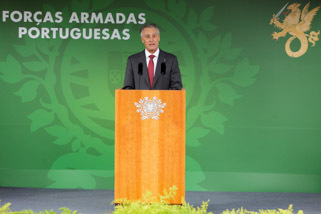
We commence the second international conference of a cycle of initiatives which we have named Routes to the Future.
The first of these conferences, held in February last year, was dedicated to issues of Portuguese demography, with special regard to the evolution of fertility and birth rate.
The theme that brings us together today is the presence of Portugal and the Portuguese in the World, comprising the historic view with the prospective reflection surrounding the opportunities of cooperation and international development.
Our interest is the future, far further than the immediate. What interests and concerns us is to construe a vision that musters us and unites us in what is fundamental.
We stated in the opening session of the first conference that “it is in difficult times that we must have the audacity to think the future. The hardiness of the present must not inhibit us to see further”. One year later, these words gather special significance.
In effect, it is above all in adverse circumstances that it is important to look ahead, to carry out medium and long term scanning, to identify what will be changed and what will remain. It is thus that we may prepare ourselves not to be surprised by the turmoil of the global change.
Almeida Garrett, when publishing in 1830 the essay Portugal in the European Balance of Power, a title that inspired the theme of this Conference, had a simple objective: “keep well awake in the memory of the Portuguese the causes and effects of our errors and disaster, so that in the future some are corrected and the others avoided”.
It is with the knowledge of the past, the understanding of the present and the prospective reflection that we learn to choose, to design and tread the paths of the future. Surprise only strikes those who cannot anticipate evolution. Those that are unable be freed of the myths and webs of the past, will find it very difficult to awaken to hope and help construing a better future.
Mentioning hope is not enough. It is urgent to conceive it and transmit it through a well based and coherent vision, sustained in a proposition where people may view themselves.
This reflection becomes more than ever urgent with the recognition that a new economic, cultural and political geography exists in the World. The ancient dualisms of development, which separated, by their contrast, the North and the South and, by their nature, the East and the West, far from represent the new trends of international relationships.
Globalization promoted new transnational dynamics, in which the logic of blocks tends to be replaced by the logic of networks.
The growing difficulties of States in dealing with ever more open and globalized markets and technologies contrast with the multiple opportunities those small and large corporations unveil more or less all over.
Nation’s assertions tend, more than ever, to be sidelined when faced with the relevance of cultural and civilizational bonds and the denationalization of the large social and business networks.
It is another World which is being redesigned.
It is within this context that it is important to reflect over Portugal’s role in this very changed World and over its strategic positioning in this new geography.
Is it that the lack of territorial and economic dimension may be compensated with strategic relevance?
How can we boost our capital of knowledge and experience in the relationship with the worldwide diversity of cultures and civilizations?
And Portuguese? The fifth language spoken in the World; how can this fact be transformed into a competitive advantage?
The Diaspora? Represented by hundreds of Portuguese communities spread all over the World; what added value can it represent for our strategic repositioning?
And the Sea? Unavoidable in our History, can it not constitute a route of the future?
These are some of the many issues we can formulate as a starting point for this reflection.
I am certain that we will obtain stimulating and promising answers during this Conference.
This is guaranteed by the superior competence and the wide range of knowledge of our guests.
Allow me to take advantage of this moment to thank you all for the availability and the generosity with which you accepted my invitation.
We will not forget the inestimable contribution represented by your presence and your thoughts.
To those who will preside at each of the panels, to the guest lecturers, to the representatives of the Diplomatic Corps and to the Portuguese institutions present here, my best thanks.
A special word to the young scientists present in the audience in representation of all the university centres, which are dedicated to research and production of knowledge in the area of international relations.
We expect much from your work and from your capability in creating a new view and a new understanding on Portugal’s role in the World. I equally hope that this Conference may constitute, also for you, an incentive and a vote of confidence to deepen some of the issues which will be approached today.
Before ending, I wish to thank the Champalimaud Foundation, represented by Mrs. Leonor Beleza, the support provided by making available these magnificent facilities for this initiative to take place.
I wish you all a stimulating participation and hope that the work of this Conference launches new paths for reflecting over our collective future.
Thank you very much.
© 2006-2016 Presidency of the Portuguese Republic
You have gained access to the records of the Official Site of the Presidency of the Republic from 9 March 2006 to 9 March 2016.
The contents available here were entered in the site during the 10 year period covering the two mandates of President of the Republic Aníbal Cavaco Silva.